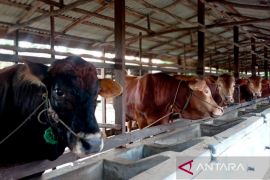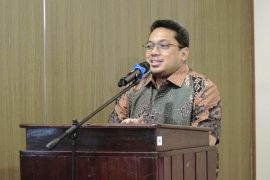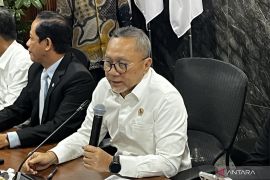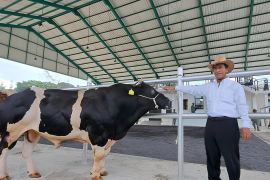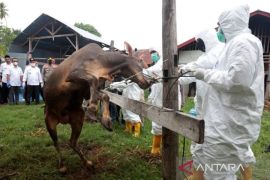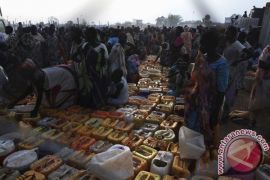They said that the Australian move to stop its livestock exports to Indonesia on the pretext that abattoirs at home had committed cruelty to the animals before slaughter was only a trick.
It aims to increase Australia`s meat exports and halt supply of cattle breeding stock to Indonesia which might cause the country unable to achieve its target of cattle self-sufficient in 2014.
Cattle breeders in Boyolali, a well-known "milk town" in Central Java and one of the cow producing centers supplying almost all regions in Central Java and Jakarta, hailed the suspension of cattle imports from Australia.
They think the measure would automatically cause a rise in the price of local cows. Local cow breeders in Boyolali would get an advantage following the suspension of imports of cows from Australia, Timur, a breeder from Selo, Boyolali, said on Friday. He said if cow imports from Australia were not stopped they could hurt the price of local cows and the farmers.
Therefore, the Indonesian Cattle Ranchers Association (HPI) also urged the government to reject Australia`s meat exports. "The government should well reject meat exports from Australia," HPI Executive Board Chairman Rudy Prayitno said Thursday.
He said that Australia had officially notified Indonesia that it would stop its exports of slaughter cattle and cow breeding stocks to Indonesia after it reportedly learned that the Indonesian abattoirs did not meet the slaughter standards.
"Australia`s reason for halting its livestock exports to Indonesia because Indonesian abattoirs have failed to meet national slaughter standards is only a fabrication," Rudy said.
He said that the rumors about Indonesia`s failure to meet the national standards in the slaughter house were not true and were only fabricated by non-governmental organizations in Australia.
"Australian NGOs deliberately fabricated the issues by saying the slaughter of the animals in Indonesia did not meet the standards so that exports to Indonesia would be stopped and Indonesia`s cow production and population would be reduced," he said.
Rudy said that if Indonesia does not import cows from Australia, its cow production and population would drop so that it would not be able to achieve its goals of self-sufficiency on cow production in 2014.
This is also a trick to increase Australia`s exports of meat to the country. Therefore, Rudy called on the government to take firm attitude to reject Australian meat exports if it really stopped its exports of cow offspring to be bred in Indonesia.
"Just reject it, so that we would not have any relations regarding cows with Australia. That would disadvantage us," he said.
Former vice president Jusuf Kalla said the stoppage of Australia`s exports of cattle breeding stocks should not be worried about. It would not reduce Indonesia`s cattle production. According to Kalla, the import restrictions can actually increase the production of cow in Indonesia, and encourage cattle ranchers to increase production and that the self-sufficiency in beef target would be achieved.
"There will be no problem, we should be optimistic. The availability of our cows is enough, we can be self-sufficient in beef," Kalla said.
Kalla is optimistic that Indonesia is able to meet the needs for cattle of the community, considering that Indonesia once exported cattle. "We must be optimistic. In the past we once exported cattle," Kalla said.
As regards, Kalla also hailed Australi`s decision to stop its laughter cattle and cow breeding stock exports to Indonesia. "I think this is a good opportunity for us to produce more cows," he said.
Kalla said restrictions on Australian cow imports will not affect the availability of cattle in Indonesia. The problem is that the availability of cattle for the community in Indonesia is enough.
In the meantime, Australia will maintain its exports of meat to Indonesia. Though it has threatened to stop its livestock exports, yet it will maintain its frozen meat shipment to the country.
Agriculture Minister Suswono said that the Australian government had notified his office that it would stop for six months only the exports of its slaughter cattle and young cows.
He said that Australia had decided to stop the export of slaughter cattle due to pressures from non-governmental organizations which found indications that cattle in Indonesian abattoirs were slaughtered not based on the animal welfare standards.
The minister said that the stoppage of the exports should have been utilized by local cow breeders to increase production and reduce dependence on imports.
The importation of livestock in Indonesia has caused the price in the local market to drop, where meat is only priced at between Rp18,000 and Rp22,000 per kg.
Head of Boyolali`s animal husbandry service, Dwi Priyatmoko, expressed his appreciation to the suspension, saying it would certainly raise the price of local cattle that has plummeted so far.
The price of live cattle in Boyolali, which supplies up to 40 tons of meat and averagely 100 live cattle a day to other regions, has dropped causing transactions to decline making many breeders to wait for the price to rise.
The price of live cattle is only around Rp18,000 per kilogram down from Rp25,000 earlier. "Following the suspension the price is now creeping up to Rp19,000 per kilogram and it is expected to continue to rise in the days to come," he said.
(A014/F001)
Reporter: Andi Abdussalam
Editor: Aditia Maruli Radja
Copyright © ANTARA 2011
